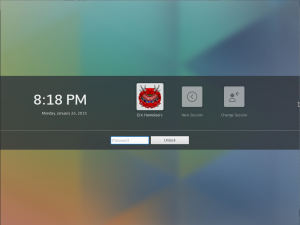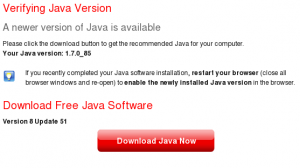
 Today my son had his last day at school – holiday time! We had little hope he would pass his semi-final year at the “middelbare school” but he managed to pull of a small miracle and passed anyway. Yay! His dad will sleep better now… and I used the relaxed mood to sit behind this computer and write a blog post about the July release of KDE 5 for Slackware-current. While my son went out to party, we slackers just install the latest and greatest software and pound it hard to see if any bugs seep out of the cracks.
Today my son had his last day at school – holiday time! We had little hope he would pass his semi-final year at the “middelbare school” but he managed to pull of a small miracle and passed anyway. Yay! His dad will sleep better now… and I used the relaxed mood to sit behind this computer and write a blog post about the July release of KDE 5 for Slackware-current. While my son went out to party, we slackers just install the latest and greatest software and pound it hard to see if any bugs seep out of the cracks.
The past month saw various KDE component releases which I let slip, because I intend to offer upgrades only when newer versions of all of Frameworks, Plasma and Applications are available. Well, there was Frameworks 5.11.0 several weeks ago but I skipped that one entirely, and today Frameworks 5.12.0 was released. The KDE Applications 15.04.3 release was already more than a week ago, and Plasma 5.3.2 one day before that, on 30 June. Time for some package building, and because the Frameworks sourcecode was made available to packagers a number of days ago, I had them ready on wednesday… but needed to wait for the public release of the new Frameworks.
Now then, my July release of the next-gen KDE for slackware-current: KDE 5_15.07. Its main components, as said earlier, are Frameworks 5.12.0, Plasma 5.3.2 and Applications 15.04.3. The updates to Applications also contain the usual KDE 4 Long Term Support (LTS) updates for kdelibs, kdepimlibs, kdepim, kdepim-runtime and kde-workplace. Hopefully Pat will fold those LTS releases back into the official KDE 4 for Slackware-current.
What’s new in KDE 5_15.07?
Well… probably all sorts of improvements under the hood of the various packages, but nothing exciting jumps out that I feel compelled to tell you about. Overall, more stability and less bugs, let’s hope. Read the Release Notes and you’ll know it all. Hey, weekend ahead! Time is on your side.
Installing or upgrading Frameworks 5, Plasma 5 and Applications
As always, the accompanying README file contains full installation & upgrade instructions. Note that the packages are available in several subdirectories below “kde”, instead of directly in “kde”. This makes it easier for me to do partial updates of packages. The subdirectories are “kde4”, “kde4-extragear”, “frameworks” “plasma”, “plasma-extra” and “applications”.
Upgrading to this KDE 5 is not difficult this time, especially if you already are running KDE 5_15.04 or later. You will have to remove old KDE 4 packages manually. If you do not have KDE 4 installed at all, you will have to install some of Slackware’s own KDE 4 packages manually.
Note:
If you are using slackpkg+, have already moved to KDE 5_15.01 or newer and are adventurous, you can try upgrading using the following set of commands. This should work but feel free to send me improved instructions if needed (assuming in this example that you tagged my KDE 5 repository with the name “ktown_testing” in the configuration file “/etc/slackpkg/slackpkgplus.conf“):
# slackpkg update
# slackpkg install ktown_testing (to get the newly added packages from my repo)
# slackpkg install-new (to get the new official Slackware packages that were part of my deps previously)
# slackpkg upgrade ktown_testing (upgrade all existing packages to their latest versions)
# slackpkg upgrade-all (upgrade the remaining dependencies that were part of my repo previously)
# removepkg sddm-theme-breeze (gone after KDE 5_15.01)
# removepkg libmm-qt5 (gone after KDE 5_15.03)
# removepkg qt-gstreamer0 (gone after KDE 5_15.04)
# slackpkg reinstall qt-gstreamer (ensure that none of the overlapping files of qt-gstreamer0 are left)
# slackpkg reinstall kactivities-framework (ensure that you are using the frameworks version of kactivitymanagerd)
And doublecheck that you have not inadvertently blacklisted my packages in “/etc/slackpkg/blacklist“! Check for the existence of a line in that blacklist file that looks like “[0-9]+alien” and remove it if you find it!
Recommended reading material
There have been several posts now about KDE 5 for Slackware-current. All of them contain useful information, tips and gotchas that I do not want to repeat here, but if you want to read them, here they are: http://alien.slackbook.org/blog/tag/kde5/
A note on Frameworks
The KDE Frameworks are extensions on top of Qt 5.x and their usability is not limited to the KDE Software Collection. There are other projects which rely (in part) on the KDE Frameworks, and if you are looking for a proper Frameworks repository which is compatible with Slackware package managers such as slackpkg+, then you can use these URL’s to assure yourself of the latest Frameworks packages for Slackware-current (indeed, this is a sub-tree of my KDE 5 “testing” repository):
Where to get the new packages for Plasma 5
Download locations are listed below (you will find the sources in ./source/5/ and packages in /current/5/ subdirectories). If you are interested in the development of KDE 5 for Slackware, you can peek at my git repository too.
Using a mirror is preferred because you get more bandwidth from a mirror and it’s friendlier to the owners of the master server!
Have fun! Eric
![]() I have made new packages for the chromium browser and its widevine plugin. Chromium version 44 was released a bit earlier this week, and it took me a while to compile, because the new OpenJDK 7u85 and LibreOffice 5.0.0.rc3 packages were ahead of it in the build queue. Guess what… now that I am writing this blog article after uploading the packages for chromium-44.0.2403.89, I notice that there was a second release of Chromium 44 Stable… today. Which makes me wonder if there was a regression in the earlier source release.
I have made new packages for the chromium browser and its widevine plugin. Chromium version 44 was released a bit earlier this week, and it took me a while to compile, because the new OpenJDK 7u85 and LibreOffice 5.0.0.rc3 packages were ahead of it in the build queue. Guess what… now that I am writing this blog article after uploading the packages for chromium-44.0.2403.89, I notice that there was a second release of Chromium 44 Stable… today. Which makes me wonder if there was a regression in the earlier source release.




Recent comments